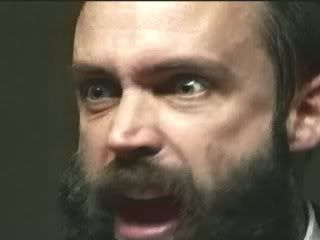Political Review: Jury-Draw Governmental Elections
I suppose this is a bit of a biased review, since it's something I've come up with over the past couple of years. It's clear to most people that democracy doesn't work in populations in excess of, oh, 30. Maybe 40. That's it. Homer Simpson said it. Kent Brockman said it. Democracy doesn't work.
In it's current form! Aye, there's the qualification. Democracy now is about as far from what the philosophers intended as Communism. In theory, both systems are flawless. In practice, you're adding a species that makes fallability an excercice in greatness. Corruption, greed, stupidity and just plain ignorance of facts will always dog any political system, but there are ways to mitigate it. The method I thought up (and that probably needs tweaking) is Jury-Draw Elections.
In the modern judicial system, juries of peers are picked at random from the entire eligible population. Even Oprah Winfrey reported, and she's a billionaire! Naturally, you can try to wriggle out of it for various personal reasons, and this ensures an unbiased group. I believe that the same principle can and should be applied to presidential politics.
A random seed of perhaps the cube root of the population would work nicely, I think, and a scaleable amount. Townships of 1000 people would have 10 candidates. Cities of 10,000 would have 20 candidates. Cities of 100,000 would have 46 candidates. A million people would have 100 candidates. The American population of 294 million would give some 660 candidates. Some of them would be excused initially due to some factors: education (at least high school would be required) age (between 25 and 65 to avoid debilitating health problems) income (under $100,000 per year). This would probably pare down half the group. A further half could opt out, OR nominate someone that they know, and feel would be more suited to the position. In the US, this would leave about 150 candidates who WANT to be President.
Now, from this point on, it is an election season. Each member is allotted a fixed amount of money with which to campaign, each dollar overseen by an part of the assigned election committee. Each person would begin outlining their platform, and studying hard on the necessary issues. Television time and travel time would allow each candidate to get their message out.
Obviously not everyone would be willing to work that hard once they realized what it would entail, and maybe a further 1/3 or so would drop out, leaving us with roughly 100 people. Initial spread-approval voting would be then used halfway through the campaign season, with each voter alloted 5 votes, worth from 1 to 5 points. The top 25% of the candidates would progress onto the next round, with more campaign money, and so forth. One month before the final election, another spread-approval vote would reduce the field from 25 or so candidates to an even 10.
From here, it would be the final month of debates, and touring, and appearances, as the candidates prepare for election night. Even the newest, least interested voters can keep track of 10 candidates and pick out the ones they like.
This period would be characterized by several prime-time television appearances of a game-show format, rather like Supertown Challenge. Candidates would be asked questions, ranging from basic essentials to more complex matters. Some good questions would be:
1.) What country do we owe the most money to, and why?
2.) What country do we have the most weapons aimed at, and why?
3.) How long do you think a low-income mother should have to wait with her sick child in an emergency room?
4.) How much do you think it should cost to fill the gas tank of a family car?
5.) How many millions of dollars in a trillion dollars? (3 second limit)
6.) How many millions of tons of pollutants does this nation's infrastructure produce daily? Answer in solid, liquid, and gaseous quantaties.
7.) How would you give the nation's millions of homeless a safe home and a second try?
And so forth, and so forth. British Prime Minister Tony Blair does this every Wednesday on his own TV show, and yet I get the feeling Bush or Kerry would likely explode without the ability to answer after consulting their committee.
The final voting day would be similar to spread-vote and proportional representation. Three votes per person, with a point value of one, two and three. The top three point-earning candidates would form the next Presidential office.
Whats that, you say? Three Presidents? Yes, thats right, a tripartisan system. The government would be composed of elected positions, from Environmental Minister to Minister of Finance, and so forth, ensuring that party politics are essentially negated. Every single person in the govenrment is now answerable for all of his or her actions, and easily replaceable. The tripartisan head of state would have to work and compromise and agree on actions and courses of legislation, with two able to over-ride a veto from the third party given that the two have the support of a given portion of the governmental office. This way one person cannot stonewall the entire government on an issue he or she disagrees with, but it also guarantees two Presidents cannot act outside the wishes of the people.
I may be whizzing on the electric fence here, but this is my idea.


0 Comments:
Post a Comment
<< Home